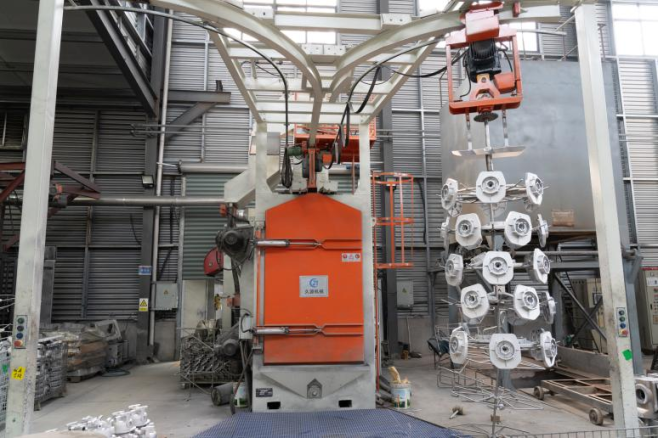1. Introduction: Why Aluminum Die Casting Matters
Aluminum die casting is a key manufacturing process that shapes metal parts with high precision and efficiency. This process forces molten aluminum into steel molds under high pressure to create complex shapes with smooth surfaces and excellent dimensional accuracy. As a leading provider of aluminum die casting services, Tiger Casting specializes in delivering high-quality castings suitable for a variety of industries including automotive, aerospace, electronics, and more. In this ultimate guide, we will explore the detailed process of aluminum die casting, the common alloys used, and the wide range of applications this versatile technique supports.

2. The Aluminum Die Casting Process Explained
The aluminum die casting process consists of multiple critical steps that ensure each part meets stringent quality and design standards. Here is a step-by-step overview:
Step 1: Mold Design
The process begins with designing a mold, which is typically made of tool steel and consists of two halves forming the cavity for the desired part. Mold design takes into account the shape complexity, draft angles, venting, gating, and the aluminum alloy’s properties. High-quality mold design is essential to produce precise parts and optimize the mold’s lifespan.
Step 2: Mold Manufacturing
Once the design is approved, the mold is fabricated with precision machining to match specifications. Mold manufacturing is a crucial investment, often suitable for medium to large production volumes due to its higher upfront cost.
Step 3: Melting and Alloying
Aluminum ingots are melted in a furnace, and alloying elements such as silicon, copper, magnesium, and zinc may be added to improve strength, corrosion resistance, or fluidity. The molten aluminum alloy is kept at a precise temperature for consistent casting.
Step 4: Die Casting
The molten aluminum is injected under high pressure into the mold cavity. The high pressure ensures rapid filling and prevents defects such as porosity. Once filled, the aluminum solidifies quickly to form the final shape.
Step 5: Ejection and Cooling
After solidification, the mold opens, and ejector pins push the casting out of the mold. The part is then cooled and inspected for quality before any post-processing.
Step 6: Post-processing and Quality Control
Most die-cast aluminum parts require minimal finishing, thanks to the smooth surface achieved during casting. However, additional machining, surface treatments, or coatings like anodization or powder coating can enhance corrosion resistance or aesthetics. Rigorous quality control at every stage ensures parts meet precise tolerances and performance criteria.
3. Common Aluminum Die Casting Alloys and Their Characteristics
Choosing the right alloy is essential for balancing strength, corrosion resistance, and castability. Here are three popular alloys used by Tiger Casting:
-
A360 Alloy: Known for exceptional corrosion resistance and good mechanical strength, especially at higher temperatures. It has good fluidity but can be more challenging to cast.
-
A380 Alloy: The most widely used alloy for die casting, A380 offers excellent castability, mechanical strength, and corrosion resistance, making it ideal for most applications.
-
A383 Alloy (ADC12): Similar to A380 but with slight differences in properties; it is suitable for parts requiring specific performance, though less durable than A380.
Each alloy offers unique benefits, and choosing the right one depends on the part’s intended use, mechanical requirements, and production volume.
4. Advantages of Aluminum Die Casting
Aluminum die casting offers several advantages that make it a preferred manufacturing method:
-
High Precision and Surface Finish: Die cast parts have excellent dimensional accuracy and smooth surfaces straight out of the mold, reducing or eliminating the need for further machining.
-
Strength-to-Weight Ratio: Aluminum alloys provide high strength while remaining lightweight, ideal for automotive and aerospace industries.
-
Corrosion Resistance: The natural oxide layer on aluminum protects parts from corrosion and weathering. Additional surface treatments can further enhance durability.
-
Efficient Mass Production: The process supports high-volume manufacturing with consistent quality, making it cost-effective for large runs.
-
Design Flexibility: Complex geometries and thin walls can be produced with die casting, which is challenging for other manufacturing methods.
5. Applications Across Industries
The versatility of aluminum die casting allows it to serve many sectors, such as:
-
Automotive: Engine components, transmission cases, and structural parts benefit from lightweight, durable aluminum castings.
-
Aerospace: Precision parts with strict tolerances are produced efficiently for aircraft and drones.
-
Electronics: Heat sinks, housings, and connectors rely on aluminum’s thermal conductivity and corrosion resistance.
-
Agricultural and Machinery Parts: Durable castings withstand harsh conditions and heavy use.
-
Consumer Products: Lighting fixtures, hardware fittings, and other durable goods use die-cast aluminum parts.
Tiger Casting’s advanced machinery and expertise enable it to meet diverse industry needs with quality assurance and timely delivery.
6. Why Choose Tiger Casting for Aluminum Die Casting?
Tiger Casting has over two decades of experience in aluminum die casting manufacturing, supported by state-of-the-art facilities including machines from 280T to 2500T, 18 CNC machining centers, and advanced surface finishing options. Our one-stop solutions include prototyping, casting, CNC machining, and finishing, ensuring your parts are delivered to exact specifications with superior quality. With rigorous quality control and efficient production, Tiger Casting is your trusted partner for aluminum die casting needs.
7. Conclusion: Mastering Aluminum Die Casting with Expertise
The aluminum die casting process remains a cornerstone for manufacturing high-quality, complex, and precise metal parts efficiently. From mold design to final finishing, every step impacts the final product’s performance. Choosing the right alloys and understanding the process benefits help manufacturers optimize costs and product quality.
At Tiger Casting, we combine advanced technology, skilled craftsmanship, and customer-focused service to provide reliable aluminum die casting solutions tailored to your requirements. Whether you need small or large production volumes, our expertise ensures your projects succeed with high precision and durability.
If you want to discuss your project or get a quote for aluminum die casting services, Tiger Casting is ready to assist with comprehensive solutions.
www.tiger-aluminumcasting.com
NINGBO TIGER CASTING COMPANY

